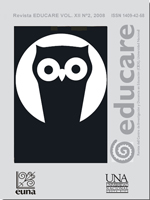Fundamentos teóricos del Pensamiento complejo de Edgar Morin
DOI:
https://doi.org/10.15359/ree.12-2.6Keywords:
complex thinking, systems theory, cybernetics theory, information and communication theory, piagetian legacy, Kuhnian paradigm.Abstract
In face of what he considered as the crisis of the Western paradigm of simplification and disjunction, based on the reduction and separation of knowledge, Edgar Morin posited the emergence of a new paradigm of complexity that would attempt to articulate and contextualize scientific, humanistic, and artistic cultures. To accomplish such purpose, Morin argued for an integration of ideas, concepts and notions drawing on different theoretical sources.
Approaching complexity has required a dialectic and creative resignification of the legacy of such theories through a new synthesis that both integrates and surpasses them qualitatively.
References
Agazzi, E. (1996). El bien, el mal y la ciencia. Madrid: Tecnos.
Ashby, W. (1997). Introducción a la cibernética. Buenos Aires: Nueva Visión.
Bateson, G. (1984). Comunicación, la matriz social de la psiquiatría. Madrid: Paidós.
Bertalanffy, L. (1974). Robots, hombres y mentes: la psicología en el mundo moderno. Madrid:
Guadarrama.
Gutiérrez, G. (2001). Notas de las llamadas crisis de los paradigmas en: Globalización, caos y
sujeto en América Latina. El impacto de las estrategias neoliberales y las alternativas. San
José, Costa Rica: Ediciones DEI.
Kuhn, T. (1977). La estructura de las revoluciones científicas. México: Fondo de Cultura
Económica.
Moreno, J. C. (2002). Tres teorías que dieron origen al pensamiento complejo: sistémica,
cibernética e información. En M. A. Velilla (Comp.), Manual de iniciación pedagógica al
pensamiento complejo (pp. 25‐37). Bogotá: Instituto Colombiano para la Educación
Superior‐UNESCO.
Morin , E. (1992). El Método IV: Las ideas. (Vol. 4), (Trad. del fr. por Ana Sánchez). Madrid:
Cátedra.
Morin, E. (1993). El Método I: La naturaleza de la naturaleza. Madrid: Càtedra.
Morin, E. (1994). Introducción al pensamiento complejo. (Trad. del fr. por Marcelo Pakman).
Barcelona: Gedisa.
Morin, E. (2002). La cabeza bien puesta. Repensar la reforma, reformar el pensamiento. Bases
para una reforma educativa. Buenos Aires: Nueva Visión.
Osorio, S. N. (2002). Aproximaciones a un nuevo paradigma en el pensamiento científico. En M.
A. Velilla (Comp.), Manual de iniciación pedagógica al pensamiento complejo (pp. 38‐59).
Bogotá: Instituto Colombiano para la Educación Superior‐UNESCO.
Piaget, J. (1967). Lógica y conocimiento científico. París: Gallimard.
Pozo, J. I. (2001). Humana mente: el mundo, la conciencia y la carne. Madrid: Morata.
Shannon, C. y Weaver, W. (1981). Teoría matemática de la información. Madrid: Forja.
Wiener, N. (1977). Cibernética o el control y comunicación en animales y máquinas. Madrid:
Tusquets.
Downloads
Additional Files
Published
How to Cite
Issue
Section
License
1. In case the submitted paper is accepted for publication, the author(s) FREELY, COSTLESS, EXCLUSIVELY AND FOR AN INDEFINITE TERM transfer copyrights and patrimonial rights to Universidad Nacional (UNA, Costa Rica). For more details check the Originality Statement and Copyright Transfer Agreement
2. REUTILIZATION RIGHTS: UNA authorizes authors to use, for any purpose (among them selfarchiving or autoarchiving) and to publish in the Internet in any electronic site, the paper´'s final version, both approved and published (post print), as long as it is done with a non commercial purpose, does not generate derivates without previous consentment and recognizes both publisher's name and authorship.
3. The submission and possible publication of the paper in the Educare Electronic Journal is ruled by the Journal’s editorial policies, the institutional rules of Universidad Nacional and the laws of the Republic of Costa Rica. Additionally, any possible difference of opinion or future dispute shall be settled in accordance with the mechanisms of Alternative Dispute Resolution and the Costa Rican Jurisdiction.
4. In all cases, it is understood that the opinions issued are those of the authors and do not necessarily reflect the position and opinion of Educare, CIDE or Universidad Nacional, Costa Rica. It is also understood that, in the exercise of academic freedom, the authors have carried out a rogorous scientific-academic process of research, reflection and argumentation thar lays within the thematic scope of interest of the Journal.
5. The papers published by Educare Electronic Journal use a Creative Commons License:














 The articles published by Educare Electronic Journal can be shared with a Creative Commons License:
The articles published by Educare Electronic Journal can be shared with a Creative Commons License: 



